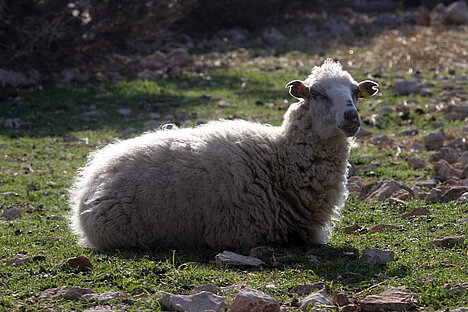Sheep's wool grease

Sheep's wool grease, also known as wool wax or lanolin, is the secretion from the sebaceous glands of sheep, which is obtained when sheep's wool is washed. It consists of a mixture of long-chain esters, di-esters and hydroxy-esters, which are formed from various alcohols and fatty acids. Sheep's wool fat has a yellowish color, a characteristic odor and a melting point of 35 to 55° C.
Sheep's wool fat has been used for centuries in cosmetics and medicine as it has a number of properties that make it suitable for skin care. It is water-repellent, moisturizing, anti-inflammatory, antimicrobial and promotes wound healing.
But how does sheep's wool fat affect your dog? Is it healthy or harmful for him? In this article, we want to answer these questions and show you some of the advantages and disadvantages of sheep's wool fat for your dog.
Benefits of sheep's wool fat for your dog
Sheep's wool fat can have several benefits for your dog, especially for skin and coat health. Here are some examples:
- Sheep's wool fat can condition and moisturize dry, cracked or flaky skin on your dog, as it binds moisture in the skin and prevents it from evaporating. This can be particularly helpful for dogs with skin conditions such as dermatitis or eczema.
- Sheep's wool fat can also make your dog's coat shiny and smooth as it nourishes and protects the hair follicles. This can be particularly useful for long-haired or rough-coated dogs that are prone to matting or hair loss.
- Sheep's wool fat can also promote wound healing in your dog as it stimulates the formation of new tissue and prevents infection. This can be particularly helpful for minor injuries such as scratches or bites.
- Sheep's wool fat can also strengthen your dog's immune system, as it is rich in vitamins (especially vitamin A) and trace elements (especially zinc), which are important for the immune system. This can be particularly useful for older or weakened dogs.
Disadvantages of sheep's wool fat for your dog
Sheep's wool fat can also have some disadvantages for your dog, especially if it is used incorrectly or overdosed. Here are some examples:
- Sheep's wool grease can trigger allergic reactions in your dog who is sensitive to wool products. This can manifest itself in the form of itching, redness, swelling or a rash. If you notice that your dog is showing such symptoms, you should stop using sheep's wool grease immediately and consult a vet.
- Sheep's wool fat can also cause digestive problems for your dog if he accidentally eats or licks it. This can take the form of diarrhea, vomiting or abdominal pain. If you notice that your dog is showing such symptoms, you should offer him plenty of water and consult a vet.
- Sheep's wool fat can also cause blockages in your dog's sebaceous glands if it is applied too often or too thickly. This can manifest itself in the form of blackheads, pimples or cysts. If you notice that your dog is showing such symptoms, you should reduce or stop using sheep's wool fat and consult a vet.
- Sheep's wool grease can also cause an unpleasant odor in your dog if it becomes rancid or mixed with dirt. This can be particularly the case for dogs with a strong inherent odor or poor coat hygiene. If you notice that your dog smells unpleasant, you should brush and bathe him regularly and avoid or limit the use of sheep's wool grease.
Sheep's wool fat is a natural ingredient that can have several benefits for your dog, especially for skin and coat health. However, it is important to use and dose sheep's wool fat correctly to avoid any potential disadvantages. If you want to use sheep's wool fat for your dog, you should keep the following tips in mind:
Choose a high-quality product that is as pure and fresh as possible. Pay attention to the country of origin, the expiry date and the quality seal of the product.
Follow the manufacturer's or vet's instructions for the application and dosage of sheep's wool fat. Do not use more than necessary and do not apply too often or too thickly.
Observe your dog's reaction to sheep's wool grease. If you notice any signs of intolerance, allergy or side effects, discontinue use and consult a vet.
Groom your dog's coat regularly. Brush him daily and bathe him with a mild shampoo if necessary. Avoid applying lanolin to dirty or wet fur.
Sheep's wool grease can be a useful supplement for your dog if used correctly. It can improve skin and coat health and promote well-being. However, it is not a miracle cure and should always be used with caution and responsibility.
If you notice any signs of hypersensitivity or poisoning in your dog, you should see your vet immediately. We are not a substitute for a vet, but we try to be as accurate as possible. Every dog reacts differently and we recommend you get a second opinion or consult your vet if in doubt.
Stay healthy and take good care of your four-legged friend!😊